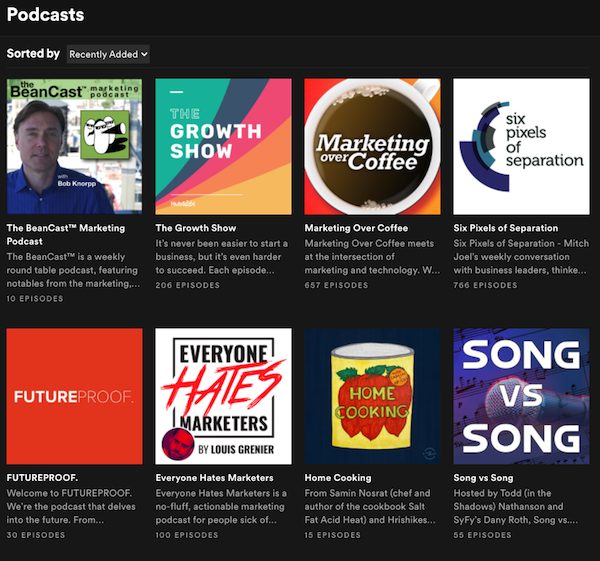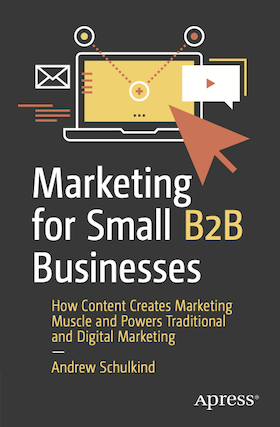If you’re considering adding a podcast to your content marketing mix, you’re going to like this article. I recently posted an item on LinkedIn about deciding whether a podcast or a blog might be right for your content marketing...
If you’re considering adding a podcast to your content marketing mix, you’re going to like this article. I recently posted an item on LinkedIn about deciding whether a podcast or a blog might be right for your content marketing efforts. Long-time friend and colleague E. B. Moss commented on that post and this conversation grew out of that quick exchange.

How do you help someone who is used to thinking in terms of copy when it comes to content to shift to the spoken word?
First, I believe it’s important to embrace as many channels as possible when it comes to getting ANY word out there – written or spoken. It’s the adage of being wherever the prospect is and offering content in the form each target audience prefers. So, I’m not sure it’s a shift so much as an additional vehicle.
That said, I think podcasting can offer the best of both worlds. First, I am a believer in leveraging the transcript – or show notes – as a blog or article. This not only enhances your discoverability and SEO, but see my first point: enables your content to be more things to more people!
Second, ask yourself “why?” Why do you want to create a podcast? You really shouldn’t embark on that path without understanding your objectives. There are no wrong answers, but your answer determines what kind of podcast you create, how and where you market it, and even the budget you commit to it. Is your objective to share your point of view in a more personal way help prospects and clients to get to know you better? To build trust? Podcasting is renowned for listeners feeling a kinship with the personalities they follow and perceiving spoken word as Word of Mouth. So, for that it may just be you expounding with additional commentary to your blog or company mission that you publish monthly. Is it to also feature your clients and enable more exposure and solidify relationships by sharing their expertise? That may spark a 1:1 interview show that you publish weekly.
Finally, with regard to transitioning copy style, those who have a written blog are hopefully crafting their content in compelling, consumable style – or “writing the way you speak.” Depending on the type of podcast you want to create you may feel more comfortable writing out your POV before recording, unless you’re a natural born expounder! For interviews I always do two things: I ask my guests what they want to be asked, then I supplement with questions I want to pose. I start with a paragraph I’ve written out to set things up…and then I prepare myself to see all those questions get thrown out the door when the conversation takes an unexpected turn! But if you have prepped yourself on your guest and the subject matter you should be able to go with the flow.
What kind of developments are you seeing in podcasting in terms of tools and technologies that make it a friendly medium for marketers?
I’d bucket this by hosting platforms, mar-tech, and discovery tools or directories. Each of those buckets has had exponential growth in terms of tactics with competition driving improvements. There are more options for hosting – from the OGs like Libsyn and Blubrry, to the newer models like Buzzsprout and Captivate…and the enhanced enterprise offerings of a Whooskaa or OMNY, for example. They are making it more turnkey to upload and gain distribution on all directories, but almost all interface now as well with a marketing tool like a Headliner or Audioburst, and transcript tools like Descript to facilitate the creation of “audiograms.” And then those tools also interface with, say, a YouTube or Twitter as well.
The historic challenge of podcast discoverability hasn’t exactly been solved yet, but with more podcatchers and discovery tools like Podchaser and GoodPods consumers are finding it easier to sort by subject or even spoken word these days.
One thing we had touched on in an earlier conversation is the shrinking call-to-action gap in podcasts. Could you talk more about that?
There are a few factors worth noting: historically podcast advertising was primarily direct response – those ubiquitous promo code for Great Courses Plus or Squarespace ads a few years back, for example. But there’s been an increase in brand awareness marketing more recently as podcasting has reached decent scale in listening – and traditional brands have come in to the space to leverage the power of storytelling or the trust of a personality. Among podcasting’s heaviest listeners the percent who “pay more attention to advertising on podcasts versus other forms of media” rose from 44% to 48% in the 2020 Super Listeners Study from Edison Research. There are tons of brand lift studies – from Nielsen, Signal Hill, Edison Research … in conjunction with NPR, or a Dax or Westwood One and others – that are showing amazing rates of unaided awareness and brand favorability after podcast ad exposure. The thinking is that listeners are actively choosing what they WANT to listen to and make the effort to subscribe or download. So, they’re pre-disposed to engage with or take action on the ads.
Is there anything different that B2B marketers should know about podcasts as a channel vs. B2C marketers?
I’m a believer in storytelling to set the brand message stage. Too many B2B marketers default to performance marketing tactics and forget that customers are people, too, and respond to B2C strategies as well. Podcasting helps humanize the brand and build emotional context for the company. I think it’s a great medium for B2B. As long as you recognize it’s a longtail process and building an audience for the smaller niche of a specific customer vertical takes time. That’s apropos your first question of written vs spoken word – and why it should be both! You need to embrace the full suite of marketing tools to grow awareness of your podcast in order to reap the benefits of growing awareness of your offerings. And if all that is daunting perhaps you should start with just advertising in podcasts instead of producing a podcast.
Are there any red flags for you when you think, “Maybe a podcast isn’t right for you,” when someone approaches you for help?
Many encouraging folks will say, “anyone can create a podcast; all you need is your phone!” While that true, it takes a little effort to launch a decent quality podcast with effective marketing that supports B2B goals. But I think it’s worth the effort, even if you start with a limited series or short “season.” Just be sure to work with someone who has “been there done a podcast” to reduce your learning curve time. And remember: patience, grasshopper.
About E.B. Moss
 E.B. Moss is a strategist, podcaster, and marketer who creates content designed to open revenue doors and humanize brands. With an expertise in B2B messaging and “explanatory journalism,” she serves as fractional Editor-in-Chief of marketing publication The Continuum, is a frequent contributor to TheCustomer, and profiles executives on her podcast, Insider Interviews with E.B. Moss.
E.B. Moss is a strategist, podcaster, and marketer who creates content designed to open revenue doors and humanize brands. With an expertise in B2B messaging and “explanatory journalism,” she serves as fractional Editor-in-Chief of marketing publication The Continuum, is a frequent contributor to TheCustomer, and profiles executives on her podcast, Insider Interviews with E.B. Moss.
Through her award-winning marketing consultancy, Moss Appeal, E.B. has generated compelling collateral, strategic campaigns and promotions for major media companies and nonprofits. Most recently she served as the inaugural Managing Editor/Head of Content Strategy for trade publication MediaVillage and previously helmed ad sales marketing departments for such brands as Food Network and Westwood One. E.B. is a sought-after conference speaker and commercial voiceover artist.
The post Is Podcasting Right for Your Content Marketing? appeared first on Andigo.













